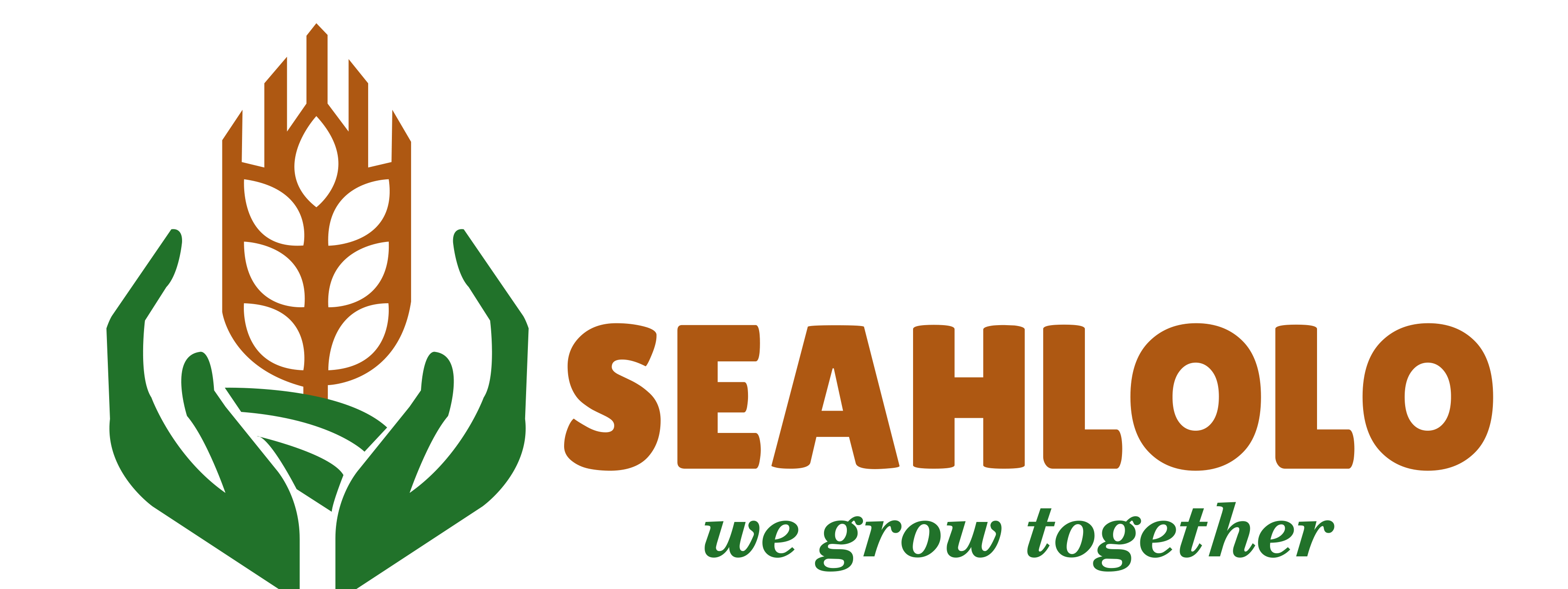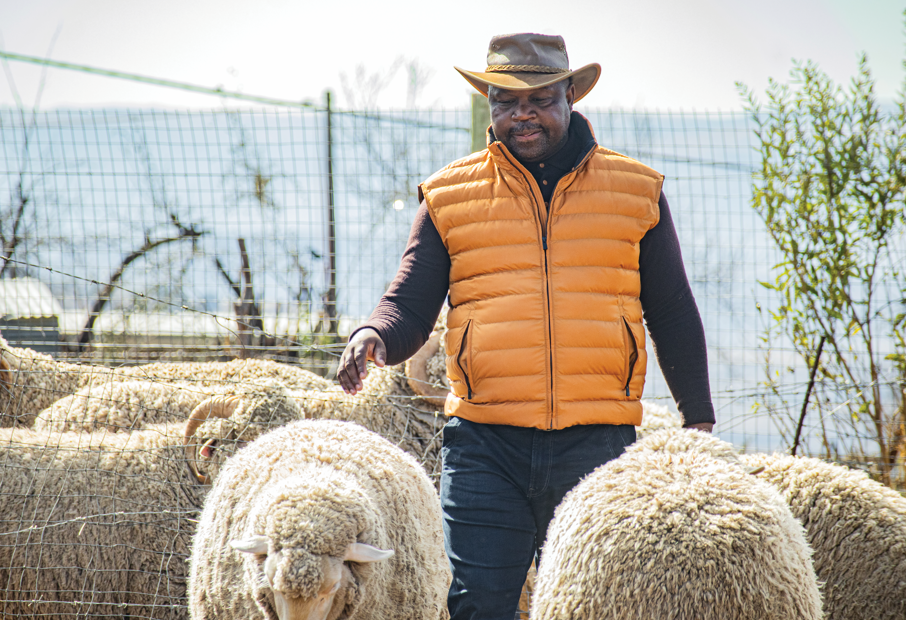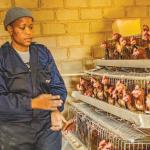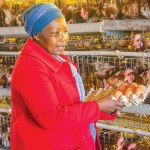By Seahlolo Reporter
As a young boy growing up in the rural mountains of Ha Seeiso in Matelile, Mafeteng, Beleme Lebajoa always dreamt of owning his own flock, sheep branded with his name, walking proudly across the highlands, and today, that childhood dream has blossomed into a thriving wool production business, backed by improved genetics, modern infrastructure, and recognition across Lesotho’s wool sector.
Thanks to the support of the Smallholder Agriculture Development Project II (SADP II), Lebajoa’s Matelile Agri Business has become not only a beacon of personal success but a hub of inspiration and mentorship for fellow farmers.
Matelile Agri Business began its journey in 2019 with just ten sheep purchased from auction shows.
Its efforts were improved through basic care and hard work to attain excellence.
By 2022, that humble flock had multiplied to 112.
“The quality wasn’t top-tier, but it wasn’t bad either. It was enough to work with,” he says, with a humble chuckle.
“My production was somewhere in the middle, but it was enough to make me believe I could do more and be more in the livestock industry,” Lebajoe explains.
What changed everything for his business was an encounter with an agricultural extension officer during a random farm visit.
“They were impressed with how I was improving the quality of my sheep and how I was managing the organic growth,” he recalls.
“That’s when they told me about SADP II and its grant opportunity for Basotho farmers. They encouraged me to apply, and I did.”
Determined to seize the opportunity, Lebajoa, through Matelile Agri Business, made a bold decision: he sold most of his flock to raise the M100,000 contribution required from a farmer to qualify for the grant, a risk that paid off.
Having qualified for the grant, the SADP II awarded him a borehole, a sheep shed, 40 improved ewes and 2 rams, genetically superior animals that would set his farm apart and elevate his breeding.
With guidance and support from the SADP II, Matelile Agri Business’ flock began transforming.
He mated 20 of the new ewes and achieved a remarkable 17 successful births.
“Of those 17, I sold eight rams to other farmers, and suddenly my farm became a go-to place for improved breeds. The genetics on my farm became so good that other farmers started coming to me even when I thought it was not fashionable,” he says proudly.
His farm quickly earned a reputation as a source of quality genetics for aspiring wool farmers in the area.
Matelile Agri Business’ success caught the attention of a local shearing shed facility in Mafeteng.
“After partnering with other farmers in the area through the shearing shed, the overall wool quality produced at the shed improved significantly, and this collaboration opened even more doors.
“That’s how I learned about the district and national wool and mohair shows,” he explains, saying that before then, he didn’t know they existed.
In Matelile Agri Business’ inaugural district-level show, it emerged as a top performer, earning itself spot to represent Mafeteng at the national level.
Competing with improved genetics supplied by SADP II, Matelile Agri Business was placed among the top ten national wool producers.
“One of my rams brought home a prize,” he beams.
The following year, Matelile Agri Business entered again—with even more animals—and came back with four awards: second and third place in the ram category, and two awards for his ewes.
“For me, the shows are not just about winning. They are a way to measure your progress as a farmer, to learn from others, and to understand what it takes to produce top-quality fleece.
“You meet people, share knowledge, learn about feeding programmes and vaccination schedules. It is more than a competition, it’s a classroom.”
Lebajoa doesn’t shy away from the challenges either.
“Livestock farming isn’t easy. Merino sheep need a different kind of care. They require special attention, from feed and vaccination to shelter and water. Feeding, in particular, is one of the biggest hurdles. It is expensive to feed them right, that’s why I always tell farmers to grow their own feed if they can to minimise costs.”
Matelile Agri Business is not just talking but is leading by example: a certified block farmer, the company has planted 88.4 hectares of maize to support its sheep through a self-managed, sustainable feeding scheme.
The maize is mixed with minerals and supplements to ensure the livestock sheep produces high-quality wool and good quality ewes.
“It’s financially wiser this way and it ensures I can control what goes into my animals,” he notes.
SADP II’s support didn’t end with the livestock. They also helped Lebajoa’s Matelile Agri Business expand its infrastructure.
“Before, I had a stable that could only house 70 sheep, but with SADP’s help, I now have one that accommodates 100. That alone has changed everything,” he says.
In addition, the project helped the business set up a reliable water supply system. “Now we have water 24 hours a day, and that’s a blessing most people overlook, but it’s essential for any livestock farmer; in fact, water is essential in all agricultural activities,” he stresses.
The impact of SADP II on Matelile Agri Business goes beyond numbers and prizes. It’s about the transformation of a person, a household, and a community. Today, it employs three permanent workers and offers seasonal employment to three more. And more importantly, it serves as a training ground for others.
“When farmers come to buy rams, I don’t just sell them animals. I offer skills transfer workshops.
“I mentor them on feeding, lighting, disease prevention, and how to improve genetics. That way, we all grow together,” he says.
For Lebajoa, this isn’t just farming—it’s legacy-building through Matelile Agri Business.
“It takes time to improve a farm. Breeding takes patience, but with support like what I received from SADP II, the process becomes faster, and the results are visible.”
He is already planning the next steps: more improved rams, more structured training, and eventually, a fully independent wool production hub for his district.
Beleme Lebajoa and Matelile Agri Business’ story is a reminder that dreams, no matter how distant they may seem, are always valid—especially when matched with commitment, community support, and the right kind of help. Through SADP II’s investment, one shepherd’s dream is now shaping the future of wool farming in Lesotho.
Sponsored by





